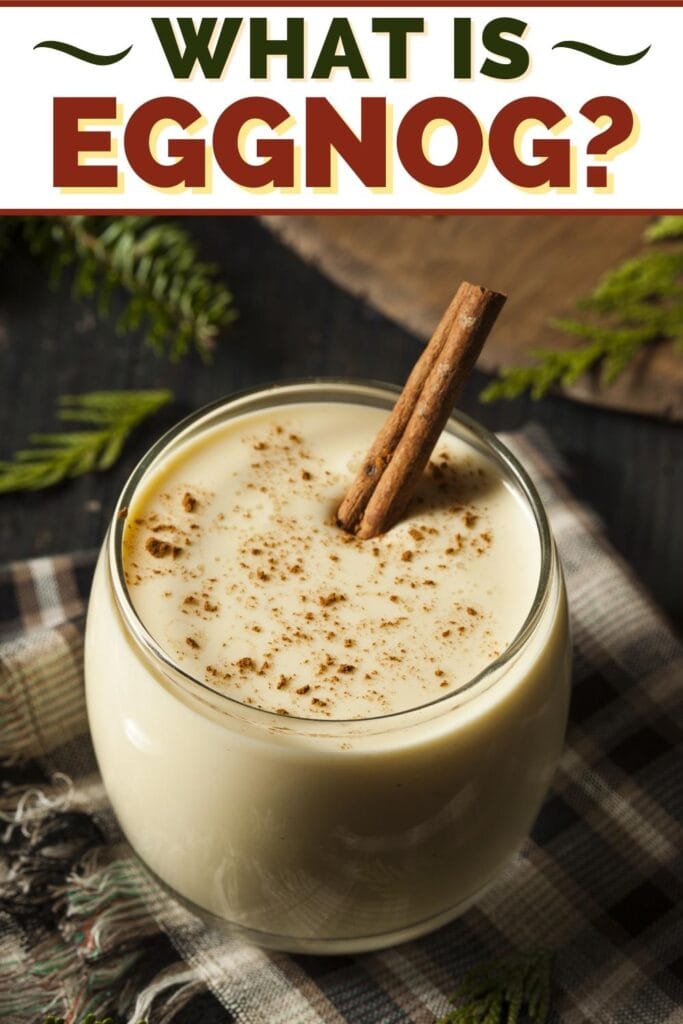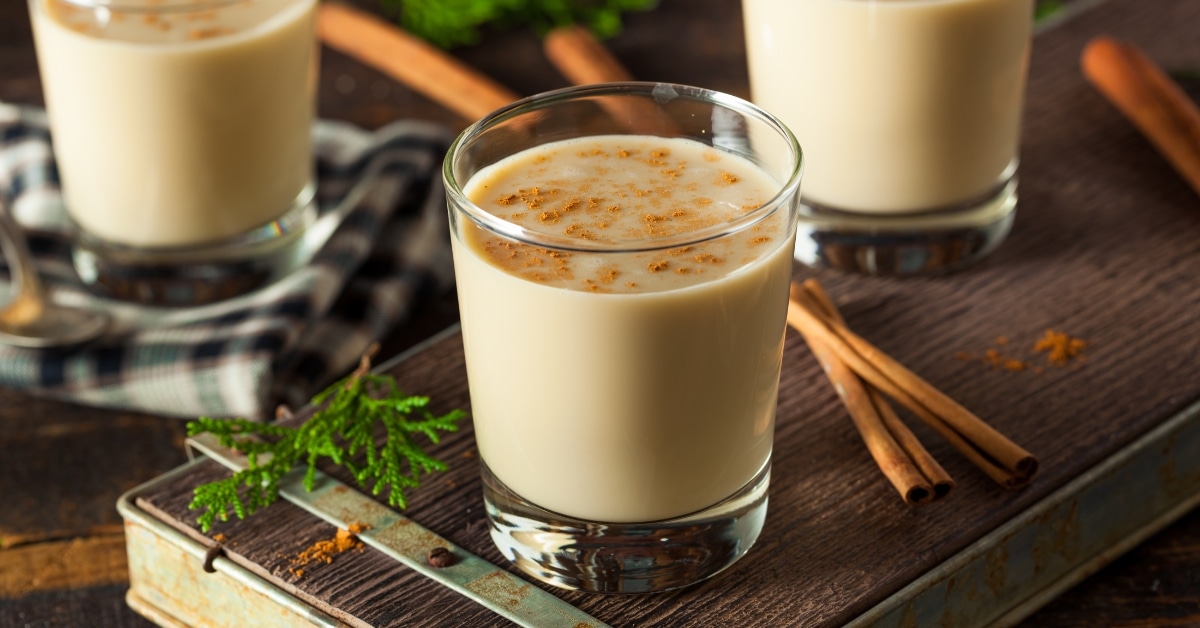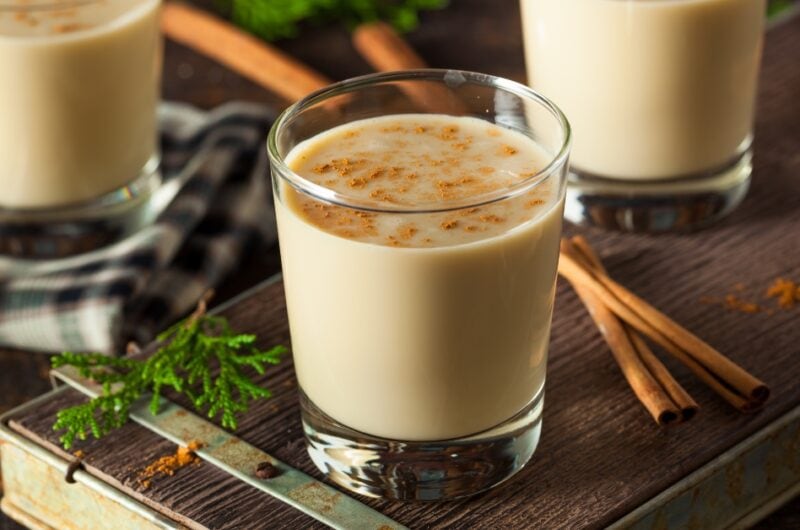Even if you’ve never had it before, chances are you’ve heard of eggnog. But what is eggnog, exactly?
Simply put, eggnog is a mixture of raw (or sometimes cooked) eggs with warming holiday spices like cinnamon, nutmeg, and vanilla.
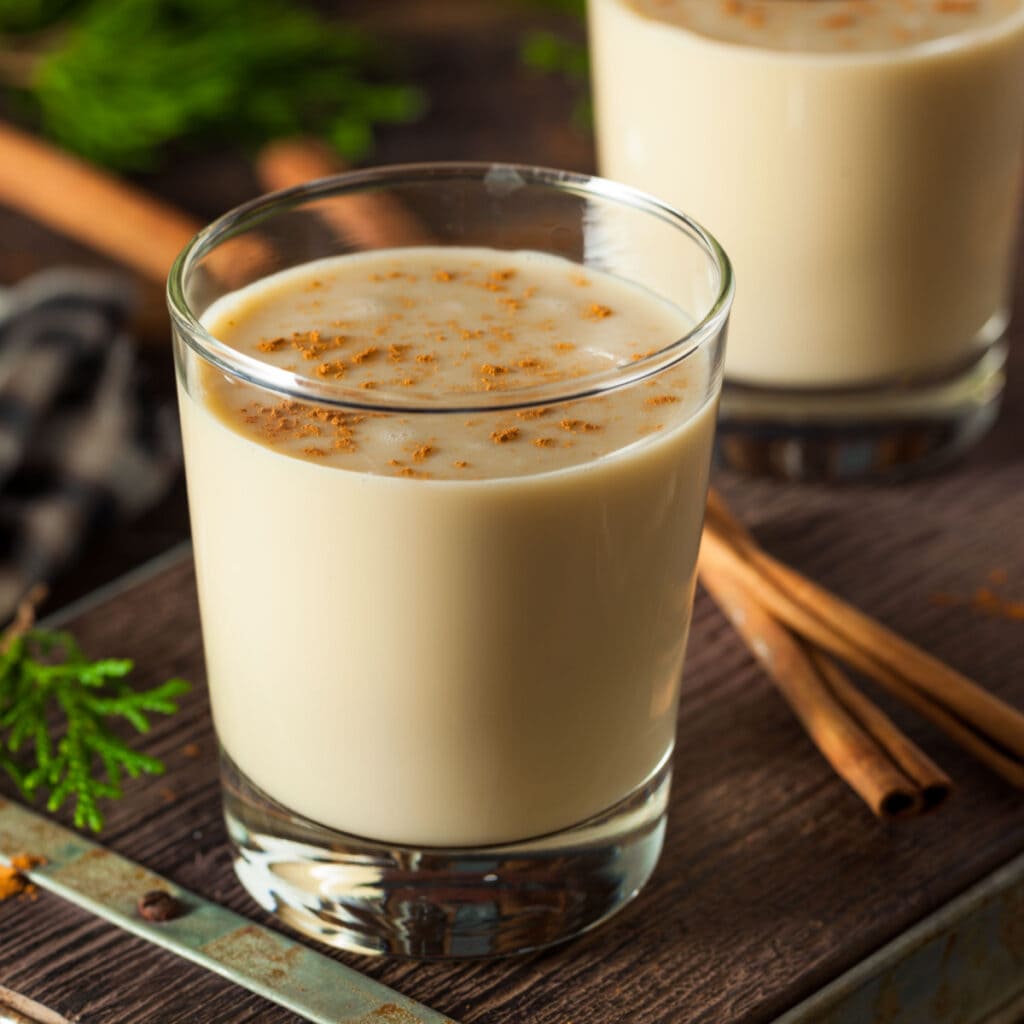
And once those holiday lights go up, there’s no escape from this creamy, eggy drink.
It’s often served alone, spiked with Brandy, or used in an array of eggnog cocktails.
If you aren’t a fan of eggnog, it might mean that you have never had good eggnog. And I want to fix that!
So, let’s take a look at eggnog, a brief glimpse into its history, and the best way to enjoy this holiday classic.
What Is Eggnog?
Eggnog combines eggs, cinnamon, nutmeg, heavy cream, and sugar.
It’s an incredibly thick drink, like an un-set custard, and very rich. As in, little goes a long way.
It’s often served cold or spiked with a little booze. Or, you can warm it slightly and enjoy it by the fire like a cup of hot cocoa.
As mentioned, eggnog often calls for eggs. But there are two types of eggnog: raw and cooked.
- Cooked Eggnog: The type of store-bought eggnog that you get at the grocery store uses gently cooked eggs.
- Raw eggnog: Classic, homemade recipes use raw eggs.
And if you are uneasy about drinking eggs, you can also make it vegan. But more on that a little later.
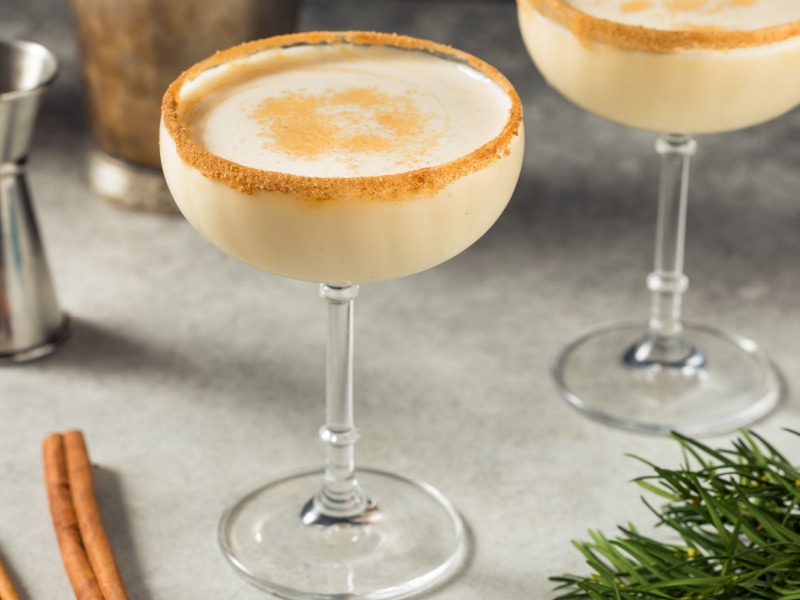
What Does Eggnog Taste Like?
Eggnog is thick, rich, and very sweet.
Those sweet flavors are the perfect backdrop for warming spices like cinnamon and nutmeg.
It has a flavor similar to custard, with a texture like a cup of melted vanilla ice cream.
Some eggnog recipes omit the cinnamon and nutmeg, yielding a custard-like beverage.
Cinnamon and nutmeg add warm, savory notes, making it the ultimate holiday drink.
That said, it’s also incredible in these eggnog dessert recipes!
And to take those intensely creamy, savory flavors over the top, it goes great with boozy additions like rum or Brandy.
History of Eggnog
So, how did eggnog earn such a strange name? The ‘egg’ in eggnog makes sense, but what is a ‘nog’?
The term eggnog isn’t exactly its original name, but the history of the word is still up for debate.
Some historians believe that nog is a mashup of grog (a boozy drink) and noggin (a small wooden ale mug).
Bartenders in the late 1800s served this drink called “egg-n-grog,” which eventually morphed into what we now know as eggnog.
That’s just one theory.
Other historians suggest the term nog comes from a Scottish term for nugged ale, or nugg, and the drink eggnog was born.
Whatever the origins or the strange word, we know one thing: eggnog is a very old drink!
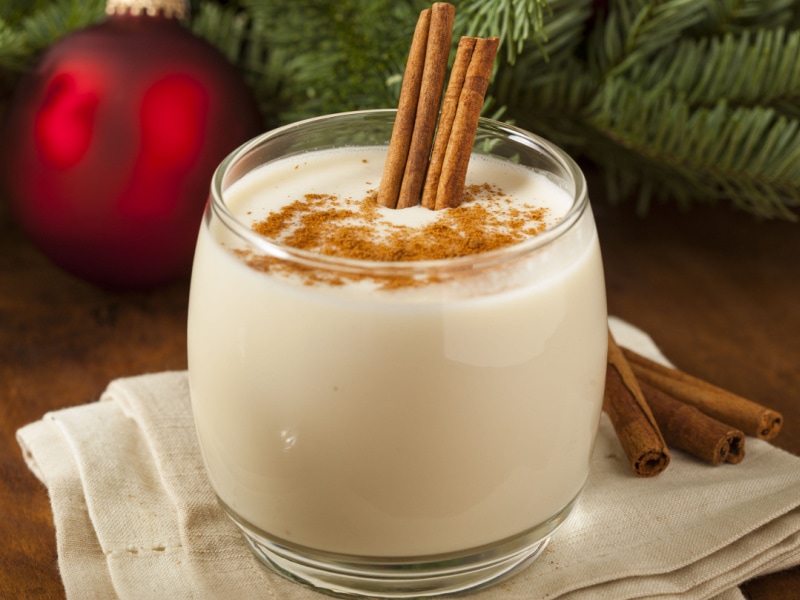
Variations of Eggnog
Variations of eggnog change slightly depending on your position on the globe.
Classic American eggnog consists of eggs, sugar, and bourbon whiskey, the liquor of choice in the South.
But if you don’t like American eggnog, maybe it’s time to head south of the border.
- Coquito: this Puerto Rican version gets the tropical treatment with a splash of coconut milk and a boozy punch from spiced rum.
- Rompope: Mexican eggnog infuses vanilla and rum with Mexican cinnamon, which is sweeter than American cinnamon, with a more complex flavor profile.
- Vegan Eggnog: Blend vegan milk (like cashew or almond) and full-fat coconut milk for vegan eggnog.
- Add cinnamon, nutmeg, vanilla, and cardamom to make it taste just like Christmas.
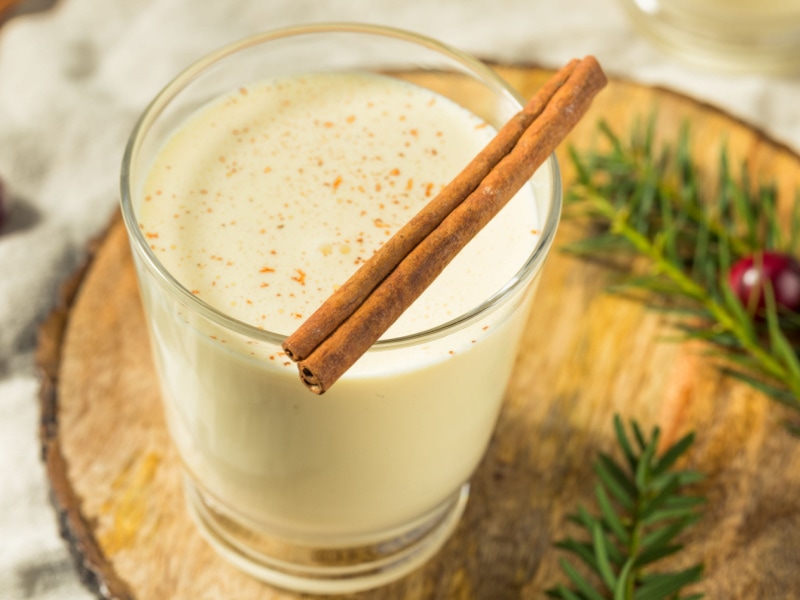
Is Eggnog Safe to Drink?
Now, on to the million-dollar question: is eggnog safe to drink?
It’s a fair question since we all resist the urge to lick the cake batter spoon because it has raw eggs.
If you prefer store-bought eggnog, you have nothing to worry about.
Store-bought brands use pasteurized eggs, and it’ i’s perfectly safe to drink.
But what about homemade, 100 percent raw eggnog? Drinking raw eggs is risky, and they could contain E. Coli.
Spiking your eggnog with alcohol will kill some harmful bacteria, but not all of it.
You have a few options if you worry about getting sick from drinking raw eggs.
Try a cooked eggnog recipe that gently cooks the eggs on the stove to kill harmful bacteria.
You can also opt for pastured eggs. When celebrating the season, it’s better to be safe than sorry!
What Is the Best Alcohol for Eggnog?
One of the reasons that eggnog is such a popular seasonal drink is that it makes an excellent mixer!
If you prefer your cocktails to be mild and not overly boozy, the thick and rich texture almost masks the alcohol flavors entirely.
When it comes to spiking your eggnog, there are no wrong answers.
Flavorful alcohol like spiked rum or brandy adds rich, buttery notes that pair well with the richness of frothy eggs and spices.
Add your favorite booze, like vodka, bourbon, or Madeira. The only alcohol that doesn’t work is tequila.
Save the tequila for Christmas margaritas!
Boozing up your eggnog gets the party started and delivers fantastic flavors to this creamy Christmas drink.
To enjoy all the flavors with none of the day-after-the-party regrets, try adding booze-flavored extracts like rum or bourbon extract.
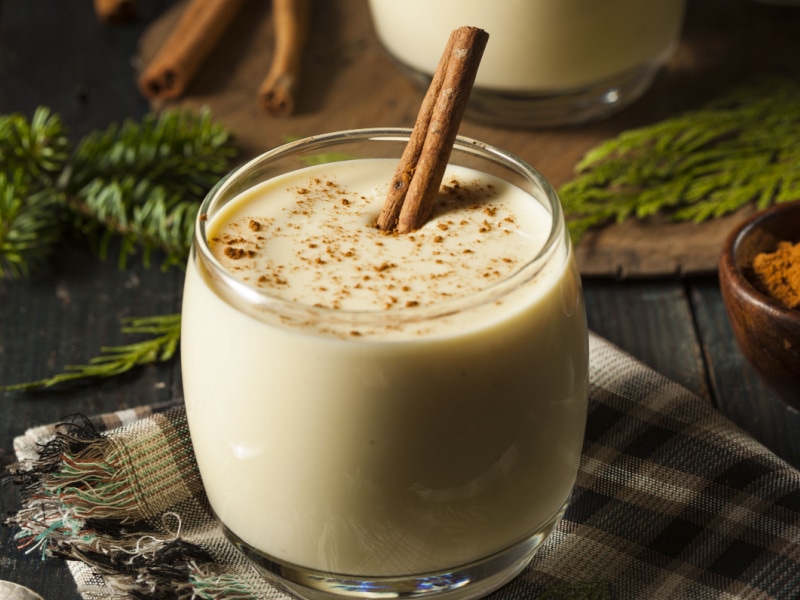
How to Make Eggnog
Making eggnog is very similar to making custard.
Here’s how it’s done:
- Separate the egg whites from the egg yolks.
- Whisk the egg yolks with sugar, and whip them into frothy goodness that doubles in size.
- Add spices like cinnamon, nutmeg, and vanilla.
- Mix in your booze of choice, or keep it alcohol-free with a splash of rum extract if you prefer.
- Whip the egg whites into stiff peaks.
- Gently fold the egg whites into the whipped yolks, then it’s ready to serve!
If the idea of uncooked eggs makes you uneasy, don’t worry! You can make cooked eggnog using the same techniques, only employing the stove.
See below for a full recipe!
